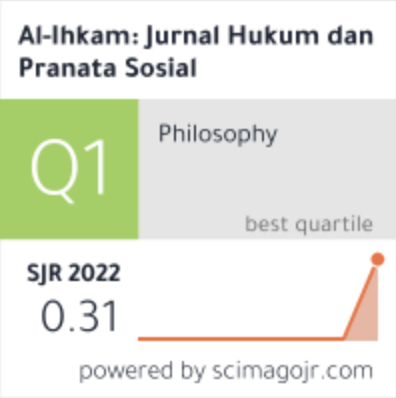Analysis of Legal Change for Women Traveling Without Mahram: A Case Study of the Kingdom of Saudi Arabia Royal Decree No. M/134 of 2019
 Abstract views: 688
,
Abstract views: 688
,
 PDF downloads: 419
PDF downloads: 419
Abstract
Downloads
References
Abu Abdullah, Muhammad bin Yazid. Sunan Ibnu Majah Juz 1. Beirut: Dar Al-Fikr, n.d.
Ad-Darimi, Abdullah bin Abdurrahman. Sunan Darimi. Riyadh: Daarul Mughni, n.d.
Al-Maraghiy, Ahmad Mushthafa. Tafsir Al-Maraghi Juz 1. Mesir: Mustafa Al-Babi Al-Halibi, n.d.
Al-Sijistaanii, Abu Daud Sulaiman bin Al-Asy’atsi. Sunan Abu Daud. Makkah: International Ideas Home, 1999.
An-Naisaburi, Muslim bin al Hajjaj bin Muslim bin Kausyaz al-Qusyairi. Shahih Muslim. Dar Al Mughni, 1998.
Anas, Malik bin. Al-Muwaththa’. Libanon: Dar Al-Ma’rifah, 2003.
Asy-Syaibani, Abu Abdullah Ahmad bin Muhammad Adz-Dzuhli. Musnad Imam Ahmad Bin Hanbal. Beirut: Muassatu Arrisalah, 1995.
At-Tirmidzi, Muhammad bin Isa. Sunan Tirmidzi. Riyadh: Maktabatu Al Ma’arif, n.d.
Azhari, Fathurrahman. “Dinamika Perubahan Sosial Dan Hukum Islam.” Al-Tahrir: Jurnal Pemikiran Islam 16, no. 1 (2016): 197–221. https://doi.org/10.21154/al-tahrir.v16i1.322.
BBC. “Saudi Arabia Allows Women to Travel Independently.” bbc news, 2019. https://www.bbc.com/news/world-middle-east-49201019.
Bukhari, Muhammad bin Ismail Al. Shahih Bukhari. Beirut: Dar Ibn Katsir, n.d.
Fawaid, Ahmad. “Reinterpretasi Hadith Tentang Mahram (Pendekatan Hermeneutika).” Nur El-Islam 3, no. 1 (2016): 176–95.
Gibtiah, and Yusida Fitriati. “Perubahan Sosial Dan Pembaruan Hukum Islam Perspektif Sadd Al-Dzari’ah.” NURANI 15, no. 2 (2015): 101–14.
Hajar, Imam Ibnu. “Reinterpretasi Hukum Larangan Bepergian Tanpa Mahram Bagi Perempuan.” Al-Manahij Jurnal Kajian Hukum Islam VI, no. 1 (2012): 143–56.
Hamzah, Ghufron. “Reinterpretasi Hadith Larangan Melukis Dan Larangan Perempuan Bepergian Tanpa Mahram (Hermeneutika Fazlur Rahman).” Jurnal Iqtisad: Reconstruction of Justice and Welfare for Indonesia 6, no. 1 (2019): 73–92.
———. “Reinterpretasi Hadith Larangan Perempuan Bepergian Tanpa Mahram Dan Larangan Melukis (Pendekatan Sosio-Historis Dan Antropologis).” The Journal for Aswaja Studies 1, no. 1 (2019): 23–33.
Hibatul Wafi, Mahmud. “Diskursus Reformasi Arab Saudi: Kontestasi Kerajaan Saudi Dan Wahabi.” Journal of Islamic World and Politics 2, no. 1 (2018): 228–39. https://doi.org/10.18196/jiwp.2113.
Hoesein, Zainal Arifin. “Pembentukan Hukum Dalam Perspektif Pembaruan Hukum (Law Making on the Perspective of Legal Reformation).” Jurnal Rechtsvinding: Media Pembinaan Hukum Nasional 1, no. 3 (2012): 307–27.
Khaeruman, Badri. “Al-Qaradawi Dan Orientasi Pemikiran Hukum Islam Untuk Menjawab Tuntutan Perubahan Sosial.” Wawasan: Jurnal Ilmiah Agama Dan Sosial Budaya 1, no. 2 (2016): 227–38. https://doi.org/10.15575/jw.v1i2.740.
———. Hukum Islam Dalam Perubahan Sosial. Bandung: Pustaka Setia, 2010.
Kodir, Faqihuddin Abdul. “Metode Interpretasi Teks-Teks Agama Dalam Mazhab Salafi Saudi Mengenai Isu-Isu Gender.” Holistik 13, no. 02 (2012): 137–65.
KSA. “Vision 2030 Kingdom of Saudi Arabia,” 2016, 1–85.
Kurniawan, Nalom. “Hak Asasi Perempuan Dalam Perspektif Hukum Dan Agama.” Jurnal Konstitusi 4, no. 1 (2011): 153–74.
Mujihastuti, Nimas Ayu. “Analisis Perubahan Kebijakan Arab Saudi Tentang Peran Perempuan Di Ranah Publik: Studi Kasus Royal Decree No. M/85 Tahun 2017.” Universitas Airlangga, 2019. https://doi.org/10.1051/matecconf/201712107005.
“Muna AbuSulayman منى (@abusulayman) on Twitter.” Accessed December 11, 2019. https://twitter.com/abusulayman.
Murniasih, Gita, Diah Handayani, and Taufik Alamin. “Proses Domestifikasi Perempuan Dalam Budaya Arab (Analisis Framing Model Zhongdang Pan Dan Gerald M. Kosicki Dalam Film Wadjda).” Mediakita 2, no. 1 (2018): 1–16.
Ni’mah, Zulfatun. “Fiqih Perubahan Untuk Perempuan (Upaya Menjawab Keusangan Dan Kekosongan Hukum Bagi Perempuan).” MUWAZAH 1, no. 1 (2009): 41–48.
Rachmadie, Cammelianne Typhano, and Suryo Ediyono. “Reformasi Sistem Kebudayaan Di Arab Saudi Masa Pemerintahan Raja Abdullah (2005- 2015).” Millati: Journal of Islamic Studies and Humanities 2, no. 1 (2017): 41–64. https://doi.org/10.18326/millati.v2i1.41-64.
“Reema Bandar Al-Saud on Twitter: ‘I Am Elated to Confirm That KSA Will Be Enacting Amendments to Its Labor and Civil Laws That Are Designed to Elevate the Status of Saudi Women within Our Society, Including Granting Them the Right to Apply for Passports and Travel Independently. 1/4.’” Accessed December 11, 2019. https://twitter.com/rbalsaud/status/1157110654089777153.
Rohman, Holilur. “Reinterpretasi Konsep Mahram Dalam Perjalanan Perempuan Pespektif Hermeneutika Fazlur Rahman.” Al-Hukama 07, no. 02 (2017): 502–25.
Roji, Fatkhur. “Kebijakan Ruang Publik Perempuan: Agenda Politik Double Interest Saudi.” International Journal Ihya’ ’Ulum Al-Din 19, no. 2 (2017): 271–84. https://doi.org/10.21580/ihya.18.1.1740.
Rosida, Anis. “Wacana Modernisasi Dalam Tantangan Peradaban, Peran Perempuan Sebagai Tonggak Sejarah Arab Saudi.” Palita: Journal of Social-Religion Research 3, no. 1 (2018): 81–96. https://doi.org/10.24256/pal.v3i1.195.
“Saudi Arabia: Law on Passports Amended to Allow Women to Travel Abroad Without a Male Guardian | Global Legal Monitor.” Accessed December 10, 2019. http://www.loc.gov/law/foreign-news/article/saudi-arabia-law-on-passports-amended-to-allow-women-to-travel-abroad-without-a-male-guardian/.
“Saudi Arabia Extends New Rights to Women in Blow to Oppressive System - The New York Times.” Accessed December 11, 2019. https://www.nytimes.com/2019/08/02/world/middleeast/saudi-arabia-guardianship.html.
Soekarba, Siti Rohmah. “Determinants of Patriarchy in the Middle East: Hope for the 2030 Vision in a New Saudi Arabia.” In 2nd International Conference on Strategic and Global Studies (ICSGS 2018), 365:193–200. Atlantis Press: Advances in Social Science, Education and Humanities Research, 2019.
Ulya, Atiyatul. “Konsep Mahram Jaminan Keamanan Atau Pengekangan Perempuan.” Al-Fikr 17, no. 1 (2013): 245–55.
Utami, Maulidah Tri. “Mahram Implications in Women’s Travel.” Jurnal Hunafa: Studia Islamika 16, no. 1 (2019): 88–110. https://doi.org/10.1017/CBO9781107415324.004.
سعود, سلمان بن عبد العزيز آل. “مرسوم ملكي رقم (م/134) وتاريخ 27-11-1440هـ.” 1440/11/29 العدد 4790, الصفحة 14, 2019. https://perma.cc/9PHW-EG7D.
In order to be accepted and published by Al-Ihkam: Jurnal Hukum dan Pranata Sosial, author(s) submitting the article manuscript should complete all the review stages. By submitting the manuscript, the author(s) agreed to the following terms:
- The copyright of received articles shall be assigned to Al-Ihkam: Jurnal Hukum dan Pranata Sosial as the publisher of the journal. The intended copyright includes the right to publish articles in various forms (including reprints). Al-Ihkam: Jurnal Hukum dan Pranata Sosial maintain the publishing rights to the published articles.
- Authors are permitted to disseminate published articles by sharing the link/DOI of the article at Al-Ihkam: Jurnal Hukum dan Pranata Sosial. Authors are allowed to use their articles for any legal purposes deemed necessary without written permission from Al-Ihkam: Jurnal Hukum dan Pranata Sosial with an acknowledgment of initial publication to this journal.
- Users/public use of this website will be licensed to CC-BY-SA.



.png)
_1.png)










